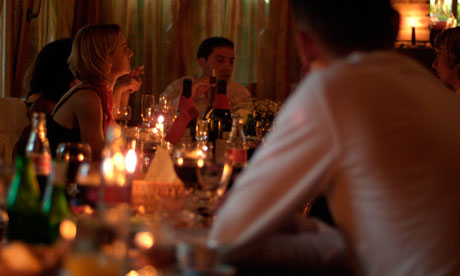
As I type this, hundreds, perhaps thousands of writers across the world are hunched in similar fashion over their own computers, pounding out stories of lissome young students having their bits clamped by dashing billionaires, nurturing their inner goddesses and frantically screaming safe words. Successful novels generate imitators that swoon in their wake like groupies, copying style and subject matter, but rarely capturing the zest or freshness of the original. Literary agents must be watching for that deluge of Fifty Shades rip-offs on their slush piles like Pacific islanders watch for tsunamis.
It is a rather better book that acts as the model for Dutch author Herman Koch's The Dinner, which has sold more than a million copies across Europe. Lionel Shriver's We Need to Talk About Kevin (2003) is still the best of a recent slew of literary works dealing with the impact of acts of violence on bourgeois family life. The success of that novel was driven by Shriver's cool-headed unwillingness to apportion blame between the evil son and his calculating, compassionless mother, so that the reader becomes a moral arbiter, forced to take sides in the nature-nurture debate. Like The Slap (2009), another novel to which The Dinner's publishers attempt to wed it in their accompanying blurb, ...Kevin was not a nice book, and left many complaining about the lack of likable characters, but the moral heft of the novel and the cool, anthropological eye that Shriver turns on her dramatis personae lifted it a cut above its companions on the bestseller lists.
The Dinner won't win plaudits from those looking for saintly protagonists, either. It is the story of two brothers, Paul and Serge, and their wives, Claire and Babette, who meet for dinner in a swanky restaurant in Amsterdam. Each of the couples has a 15-year-old son and, we discover, the dinner has been arranged to discuss a horrifying act perpetrated by the two boys. No Columbine-style massacre, this one, rather a kind of extreme happy-slapping, where a homeless woman was beaten and burned to death, all of it filmed and then viewed by millions on YouTube.
The Dinner bears one of those strikingly interchangeable subtitles – How Far Would You Go to Protect the Ones You Love? – which aim to hook in the browsing book-buyer, but in fact it isn't about this at all. Like We Need to Talk About Kevin, it is about the nature of evil, and the extent to which we can blame parents for the misdeeds of their children. The novel is narrated by one of the brothers, Paul, a former teacher. Serge, far more successful than Paul, is an up-and-coming politician and minor celebrity (I pictured him as Troels Hartmann from The Killing) and Koch nicely conveys the resentment and deep-seated competitive angst of brotherhood: "He sawed his own wood for the fireplace as well; sometimes it looked almost like a publicity shot for his election campaign: Serge Lohman, the people's candidate... a regular man like any other, the only difference being that few regular men could afford a summer home in the Dordogne." As the novel progresses, we realise that Paul's animosity towards his brother is just one of a host of resentments that simmer beneath the surface of his narrative.
It is not long before we guess that Paul is that most familiar of literary tropes, the unreliable narrator. A first-person voice requires us to enter into a pact with the narrator: we agree, for the course of the novel, to see the world through his or her eyes. This is why the unreliable narrator, handled properly, works so well. In a couple of recent examples – Sebastian Faulks's underrated Engleby and Henry Sutton's credit-crunch thriller Get Me Out of Here – the revelation that the narrator has been pulling the wool over our eyes is played so deftly that it feels like a shocking betrayal when the truth becomes clear. In The Dinner, the reveal is rather more predictable and pat, the reasons for Paul's duplicitous nature a confusing admixture of nature and nurture.
There's one other duff note. The dinner itself is described in tiresome detail, its various courses presented by a sinister maître d' with an ominously hovering pinkie finger and then analysed at length in Paul's narrative. The pretentiousness of the fare is clearly meant to hold a mirror to the corpulent self-satisfaction of its bourgeois protagonists: "The lamb's-neck sweetbread has been marinated in Sardinian olive oil with rocket... the sun-dried tomatoes come from Bulgaria." But in the land of Heston Blumenthal and bacon and egg ice-cream, it all came across a little gastro-pub and tame, the descriptions overly windy and censorious.
The Dinner lacks the weight and finesse of We Need to Talk About Kevin, but it is a well-paced and entertaining novel. It will sit well with The Slap and Christopher Wakling's What I Did (2011) on the shelves of those who enjoy seeing what happens when the cosy certainties of middle-class families are shattered, when the thin facades of decency and manners are wrenched aside, showing the brutal, violent creatures that lurk beneath the surface.

